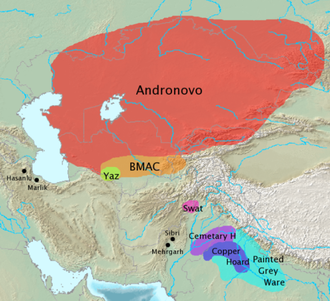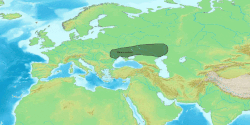Indo-Iranians




Indo-Iranians
The term Indo-Iranians refers to a group of peoples who are part of the larger Indo-European family. They are primarily known for their historical and linguistic significance, as they are the ancestors of the modern Indo-Aryan, Iranian, and Nuristani peoples. The Indo-Iranians are believed to have originated in the steppes of Central Asia and migrated southwards into the Indian subcontinent and the Iranian plateau.
Etymology[edit]
The term "Indo-Iranian" is derived from the combination of "Indo-", referring to the Indian subcontinent, and "Iranian", referring to the Iranian plateau. This reflects the geographical spread of the peoples and languages associated with this group.
Historical Background[edit]
The Indo-Iranians are thought to have emerged as a distinct group around the 2nd millennium BCE. They are associated with the Andronovo culture, which was prevalent in the steppes of Central Asia. The Indo-Iranians are believed to have split into two main groups: the Indo-Aryans and the Iranians.
Indo-Aryans[edit]
The Indo-Aryans migrated into the Indian subcontinent, where they became the dominant cultural and linguistic group. They are associated with the Vedic civilization, which laid the foundations for Hinduism and the Sanskrit language. The Rigveda, one of the oldest known texts in any Indo-European language, is attributed to the Indo-Aryans.
Iranians[edit]
The Iranians moved into the Iranian plateau and established several ancient civilizations, including the Median Empire, the Achaemenid Empire, and later the Sassanian Empire. The Iranian languages, such as Persian, Kurdish, and Pashto, are direct descendants of the ancient Iranian languages spoken by these peoples.
Linguistic Characteristics[edit]
The Indo-Iranian languages form a major branch of the Indo-European language family. They are divided into two main groups: the Indo-Aryan languages and the Iranian languages.
Indo-Aryan Languages[edit]
The Indo-Aryan languages include Sanskrit, Hindi, Bengali, Punjabi, and many others. These languages are primarily spoken in the Indian subcontinent.
Iranian Languages[edit]
The Iranian languages include Persian (Farsi), Kurdish, Pashto, and others. These languages are spoken in Iran, Afghanistan, and parts of Central Asia and the Caucasus.
Cultural Influence[edit]
The Indo-Iranians have had a profound impact on the cultures of South Asia and the Middle East. The Vedic texts of the Indo-Aryans have influenced Hindu philosophy, religion, and culture. Similarly, the Zoroastrian religion, which originated among the ancient Iranians, has influenced religious thought in the region.
Genetic Studies[edit]
Recent genetic studies have provided insights into the migration patterns of the Indo-Iranians. These studies suggest a complex interaction between the Indo-Iranians and the indigenous populations of the regions they settled in.
Also see[edit]
| Part of a series on |
| Indo-European topics |
|---|
 |
Ad. Transform your life with W8MD's Budget GLP-1 injections from $49.99


W8MD offers a medical weight loss program to lose weight in Philadelphia. Our physician-supervised medical weight loss provides:
- Weight loss injections in NYC (generic and brand names):
- Zepbound / Mounjaro, Wegovy / Ozempic, Saxenda
- Most insurances accepted or discounted self-pay rates. We will obtain insurance prior authorizations if needed.
- Generic GLP1 weight loss injections from $49.99 for the starting dose of Semaglutide and $65.00 for Tirzepatide.
- Also offer prescription weight loss medications including Phentermine, Qsymia, Diethylpropion, Contrave etc.
NYC weight loss doctor appointmentsNYC weight loss doctor appointments
Start your NYC weight loss journey today at our NYC medical weight loss and Philadelphia medical weight loss clinics.
- Call 718-946-5500 to lose weight in NYC or for medical weight loss in Philadelphia 215-676-2334.
- Tags:NYC medical weight loss, Philadelphia lose weight Zepbound NYC, Budget GLP1 weight loss injections, Wegovy Philadelphia, Wegovy NYC, Philadelphia medical weight loss, Brookly weight loss and Wegovy NYC
|
WikiMD's Wellness Encyclopedia |
| Let Food Be Thy Medicine Medicine Thy Food - Hippocrates |
Medical Disclaimer: WikiMD is not a substitute for professional medical advice. The information on WikiMD is provided as an information resource only, may be incorrect, outdated or misleading, and is not to be used or relied on for any diagnostic or treatment purposes. Please consult your health care provider before making any healthcare decisions or for guidance about a specific medical condition. WikiMD expressly disclaims responsibility, and shall have no liability, for any damages, loss, injury, or liability whatsoever suffered as a result of your reliance on the information contained in this site. By visiting this site you agree to the foregoing terms and conditions, which may from time to time be changed or supplemented by WikiMD. If you do not agree to the foregoing terms and conditions, you should not enter or use this site. See full disclaimer.
Credits:Most images are courtesy of Wikimedia commons, and templates, categories Wikipedia, licensed under CC BY SA or similar.
Translate this page: - East Asian
中文,
日本,
한국어,
South Asian
हिन्दी,
தமிழ்,
తెలుగు,
Urdu,
ಕನ್ನಡ,
Southeast Asian
Indonesian,
Vietnamese,
Thai,
မြန်မာဘာသာ,
বাংলা
European
español,
Deutsch,
français,
Greek,
português do Brasil,
polski,
română,
русский,
Nederlands,
norsk,
svenska,
suomi,
Italian
Middle Eastern & African
عربى,
Turkish,
Persian,
Hebrew,
Afrikaans,
isiZulu,
Kiswahili,
Other
Bulgarian,
Hungarian,
Czech,
Swedish,
മലയാളം,
मराठी,
ਪੰਜਾਬੀ,
ગુજરાતી,
Portuguese,
Ukrainian